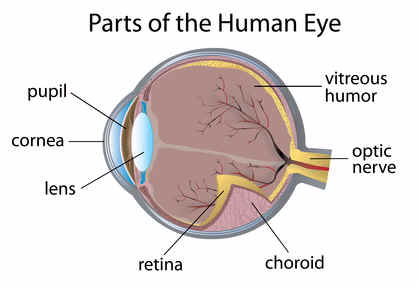Optic Neuropathy, what is it?
 What is the optic nerve?
What is the optic nerve?
The optic nerve is a special type of nerve that transmits visual information from the back of the eye to the brain.
The eye is made of three parts.
- The cornea and lens which focuses light at the front of the eye – it passes light through the hole called the pupil. The light is then focused onto the back of the eye by the lens.
- A light sensitive “film” that is at the back of the eye. It is called the retina. Tiny sensitive patches called photoreceptors cover the back of the eye. They collect information about the world – visual information. The covering of these photoreceptors form a thin film known as the retina.
- The optic nerve – a large group of communication “wires” to the brain The optic nerve is the collection of all the ‘communication’ wires (over one million) joining the eye to the brain. The information then travels to many different special ‘vision’ parts of the brain.
All parts of the brain and eye need to be present and working for a person to see normally.
What is optic neuropathy?
Optic neuropathy refers to damage to the optic nerve. When these nerves get damaged, the protective outer layer or myelin sheath becomes thinner and it is then called optic neuropathy. Due to this the vision gets blurred, and the capability to see anything in a perfect manner is lost. Severe pain may result in the eyes due to this condition.
The main symptom is loss of vision and colors appear washed out in the affected eye. In many cases, only one eye is affected and patients may not be aware of the loss of color vision until someone asks them to cover the healthy eye.
Optic neuropathy is often called optic atrophy. Medical doctors believe that it should be called neuropathy as “atrophy” means “shrunken but capable of re growth”. They do not believe that nerves can be repaired and that neuropathy cannot be fixed.
Causes of optic neuropathy
A rapid onset of optic neuropathy is typical of demyelinating (breakdown of the myelin sheath), inflammatory, ischemic (loss of blood flow to the area) and traumatic causes.
A gradual onset is typical to compressive, toxic/nutritional and “hereditary” causes.
The many causes of neuropathy are also the causes of optic neuropathy. It is the nerve that becomes damaged.
Trauma is the most common cause, but tumors, nutritional deficiencies, toxins (including tobacco and alcohol), infections, blood flow blockage, inflammatory disease, and other disease’s such as glaucoma, stroke, diabetes, high blood pressure and atherosclerosis are also a cause.
Leber hereditary optic neuropathy, is what medical doctors believe is an inherited form of vision loss that affects mostly males in their 20s or 30s. In Leber’s Optic Neuropathy the mitochondria in the cells in the optic nerve stops supplying energy, which leads to visual impairment. (Mitochondria are the energy production factories of any cell).
Other risk factors may include obstructive sleep apnea, and use of certain drugs which are used to treat erectile dysfunction.
Nutritional optic neuropathy typically involves deficiencies in vitamin B 12 (cobalamin), vitamin B 1 (thiamine), vitamin B 2 (riboflavin), and B9.
Here is a study on Folic Acid Deficiency and Optic Neuropathy
Optic neuropathies from pure nutritional deficiencies have been reported in strict vegan patients. Certain weight reduction methods, including gastric bypass surgery, may result in deficits of vitamins and can be complicated by vision loss from bilateral optic neuropathy. The use of tobacco and alcohol also deplete the body of these nutrients. Thus nutritional optic neuropathy is clearly more common among tobacco and alcohol users.
In people over 70, the blood supply to the optic nerve can be blocked due to inflammation of the arteries.
(For a list of the Causes of Neuropathy)
Treatment for Optic Neuropathy
As with any neuropathy, finding the cause and preventing more damage is necessary. If the cause is not found, the optic nerve may continue to be damaged.
There are many medications, and other remedies to bring relief, you can read it in this article Neuropathy Treatments
RECOMMENDED:
What can you do?
Take a Quiz: Am I doing everything I can to daily help my neuropathy?
Find out what lifestyle changes will help, take the quiz and get our suggestions and get our assistance on what you can do.
None of the various neuropathy treatments will build healthy nerves. You can cover up the symptoms and you can increase circulation and you can make a person feel less pain, etc., but if you build healthy nerves, there will not be any symptoms (healthy nerves don’t hurt, tingle, burn, are not numb, etc.) and the relief will be lasting.
Restoring Nerve Health *
Healthy sensory nerves mean that they are not painful. Healthy nerves means that they communicate and don’t send wrong signals such as burning, hot and cold, tingling when there is no reason for it. Healthy motor nerves mean that they relay messages from the brain to the muscle so that they move correctly. Nerves need to be healthy to function properly.
The body needs specific nutrients (vitamins) to be able to build healthy nerves.
It may not give immediate relief (although many do feel changes in the first week) as the vitamins are working at a cellular level, but it does address the actual problem, builds healthy nerves and brings lasting relief.
What can be done for lasting relief?
Find out how to Build Healthy Nerves
*Studies & Research on Nerve Health
Want to Know More About Neuropathy?
Neuropathy Information Hub
STILL HAVE QUESTIONS? EMAIL AND GET YOUR QUESTIONS ANSWERED.
Sign up to receive the MCVitamins Newsletter!
Up-to-date info on the latest health-related news happening in the world
(available in English only)

